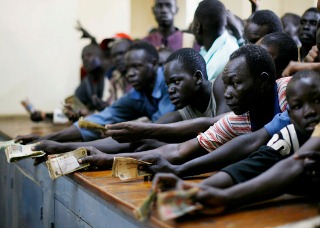S. Sudan in talks with Ugandan traders over multiple taxes
April 22, 2017 (JUBA) – South Sudan is currently in talks with traders from neighbouring Uganda after it traders declined to cross the young nation’s border post in protest over multiple taxes imposed.

The secretary of Ugandan traders and communities in South Sudan, Elia Muggaga said their members usually experience unjustified and sustained taxation after exiting the official custom points at Nimule.
He said government and traders have since Friday been talking about the way forward, saying some of the traders have crossed into the country, but the majority remained on the other border post awaiting the outcome of the negotiations with the authorities.
The spokesperson of South Sudan police, Brig. Daniel Justin a team from the police and customs was dispatched to Nimule on Friday to address the problem and would eventually brief the government.
“The government is ready to listen to them. We would like to know from them the issues which are affecting them. If it is the security, the protection will be provided as it is normally done. You know that any movement alone Nimule-Juba road is now accompanied by a joint security escort. So the issue of security is not a problem,” said Justin.
“It [problem] will be addressed. The issue of taxation will also be addressed by the relevant institutions; this was why the delegation comprised different officials”, he further added on Saturday.
South Sudan, heavily reliant on oil revenues to fund its budget, is one of poorest countries in the world with the worst indicators of development, health and education.
The conflict, which broke out in 2013, has negatively impacted on the country’s citizens, including pushing the country to the brink of famine with 5.8 million people, almost half of the population—in desperate need of humanitarian assistance, according to a recent UN assessment report.
Observers, however, say despite being oil-rich, South Sudan is likely to record negative GDP growth in 2016 after growing by 30.7% two years ago, largely due to the conflict, decline in oil production and global fall in oil prices.
(ST)
